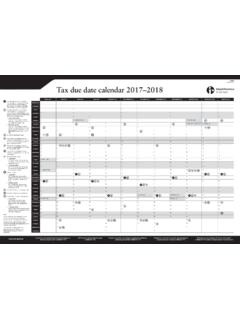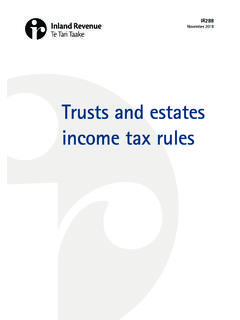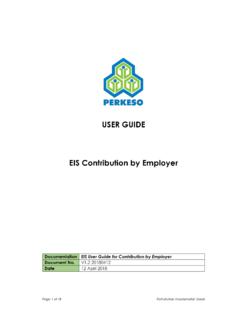Transcription of Depreciation - Inland Revenue Department
1 Depreciation - a guide for businessesIR260 February 2018 Classified Inland Revenue - Public2 DEPRECIATIONC lassified Inland Revenue 3 Classified Inland Revenue PublicThe information in this guide is based on the tax laws at the time of guide explains how to claim Depreciation on your business 're required to claim Depreciation when you acquire an asset for your business and account for it when you dispose of that asset . We recommend you consult a tax agent when considering claiming for Depreciation . However, it's still your responsibility to be aware of your tax the current Depreciation rates by: using our Depreciation rate finder checking our General Depreciation rates (IR265) 'll find both of these at rates are set out in two categories - industry and asset .
2 For Depreciation rates before 1 April 2005, check our Historic Depreciation rates (IR267) at to our website for information and to use our services and tools. Log in or register for myIR to manage your tax and entitlements online. Demonstrations learn about our services by watching short videos. Get it done online complete forms and returns, make payments, give us feedback. Work it out use our calculators, worksheets and tools, for example, to check your tax code, find filing and payment dates, calculate your student loan repayment. Forms and guides download our guides and your myIR user ID or password?Request a reminder of your user ID or reset your password online. You ll need to know your IRD number and have access to the email address we hold for to get our forms and guidesYou can view copies of all our forms and guides by going to and selecting All forms and guides from the right-hand menu, or by entering the shoulder number in the search box.
3 You can also order copies by calling 0800 257 to use this guidePart 1 - OverviewExplains how Depreciation works and how to calculate 2 - Detailed information on certain assetsGives detailed information on certain assets of particular 3 - Adjustments and disposalsThis part looks at different circumstances from adjusting for business or private use, transferring, selling or disposing of assets to applying for different rates for an 4 - Services you may needA list of Inland Revenue lists and explains many of the words and terms we use in this legal terms, depreciable intangible assets, depreciable assets, excluded depreciable assets, fixed-life depreciable assets and intangible assets are known as "property". In this guide we refer to them as assets to avoid confusion, because the term "property" more commonly relates to land and DEPRECIATIONC lassified Inland Revenue PublicContentsIntroduction 3 How to get our forms and guides 3 How to use this guide 3 Part 1 - Overview 5 Main features of Depreciation law 5 Compulsory Depreciation claims 6 Electing not to depreciate 6 How to make an election not to depreciate 7 Assets that don't depreciate 7 Who can claim Depreciation ?
4 7 Cost of assets for Depreciation purposes 8 GST and Depreciation 8 Records 9 Individual or pooled assets 9 Diminishing value (DV) method 9 Straight line (SL) method 9 Changing methods 9 Pooling method 9 Rates 11 Part 2 - Detailed information on certain assets 12 Buildings 12 Land 13 Leased assets 15 Renting out a residential property 16 Holiday homes 16 Intangible assets 16 Computer software 20 Reservation of title clause (also known as Romalpa clause) 21 Assets costing $500 or less (including loose tools) acquired on or after 19 May 2005 22 Part 3 - Adjustments and disposals 23 Newly acquired assets 23 Private use of business assets 23 Transferring depreciable assets between associated persons 25 Private assets becoming business assets 25 Disposals 25 Transferring assets under a relationship agreement 29 Transferring depreciable assets between 100% group companies 29 Local authority trading enterprises 29 Determinations 301994 to 2005 rates 312006 and future years 31 Disputable decisions 32 Special Depreciation rates 32 How we set a special rate 32 Provisional Depreciation rates 33 Higher maximum pooling values 34 Deductions for assets you no longer use 35 Part 4 - Services you may need 36 Need to talk to us?
5 36 Supporting businesses in our community 360800 self-service numbers 36 Tax Information Bulletin (TIB) 36 Business Tax Update 36 Privacy 37If you have a complaint about our service 37 Glossary 5 Part 1 Classified Inland Revenue PublicPart 1 - OverviewDepreciation allows a deduction for capital expenditure, where a deduction wouldn't normally apply and acknowledges that the asset will eventually wear out or become tax purposes, the reduced value of an asset is recognised by allowing a deduction against income for the Depreciation of that asset from the time it is used in a business until it is sold.
6 Disposed of or means the cost of the asset will be written off over its useful life. Once the whole cost price of the asset has been written off, no further deduction is you calculate your Depreciation deduction it's important to remember: the date you acquired the asset , since this determines which rates are available to you which industry and/or asset category best describes your depreciable features of Depreciation lawFrom the 1994 income year, Depreciation law relates to all depreciable assets regardless of the date you acquired them. You must make Depreciation deductions each year, unless you make an election not to treat a particular asset as depreciable. You can only claim a Depreciation deduction once you own the asset and it's used or available for use in deriving your gross income or in carrying on a business that aims to generate your gross income. Depreciation is calculated according to the number of months in an income year you own and use the asset .
7 A daily basis applies to certain assets used in the petroleum industry. From the 2011-12 income year, Depreciation on buildings has reduced to 0% where buildings have an estimated useful life of 50 years or more. This applies to both commercial and residential properties including leasehold property. For more information see page 12. You may not claim Depreciation in the year you dispose of any asset , unless it's a building. Although the general Depreciation rates are set by a formula, you can apply for a higher or lower special Depreciation rate if you can establish the general rate is unsuitable for your particular circumstances. Higher Depreciation rates, previously available for assets used for multiple shifts, do not apply to assets acquired after 1 April 1993. Expenditure for repairs and maintenance can be claimed as a deduction through business accounts. Anything more than repairs or maintenance is capital expenditure and isn't deductible, but will be subject to normal Depreciation rules.
8 In general terms the Depreciation rate options available are as follows:1. You must use the general rates set out in determinations we issue. For assets acquired on or after 1 April 2005 and buildings acquired on or after 19 May 2005, use the rates listed in the General Depreciation rates (IR265) For assets acquired between the 1996 income year and 31 March 2005 (or 18 May 2005 for buildings, including contracts of purchase entered into before 19 May 2005) use the rates listed in parts 2 and 3 of the Historic Depreciation rates (IR267) For assets acquired on or after 1 April 1993, and before the end of the 1995 income year, you can use either the rates listed in parts 2 and 3 of the Historic Depreciation rates (IR267) guide or the rates listed in part 1 of this guide plus 25% interim loading and any shift Generally, for assets acquired before 1 April 1993 you must use the Depreciation rates listed in part 1 of the Historic Depreciation rates (IR267) guide.
9 Both straight line and diminishing value methods are available for calculating Depreciation on most assets and you can switch freely between the two. Assets that cost or have an adjusted tax value of $5,000 or less can be depreciated collectively, rather than individually, using the "pool" Depreciation DEPRECIATIONPart 1 Classified Inland Revenue Public Subject to certain rules, assets costing $500 or less can be written off in the year of purchase or creation. Certain intangible assets first used or available for use after 1 April 1993 have been brought into the Depreciation system. Intangible assets with a fixed life must be depreciated using the straight line method. Gains on sale or disposal must be recognised in the year of sale.
10 Losses on sales of depreciable assets, other than buildings, are deductible in the year of sale. There are restrictions on the Depreciation deductions that can be made to depreciable assets transferred between associated parties. From 1 April 1997, only those companies that are 100% commonly owned and that choose to consolidate are able to transfer assets within their group at the assets' adjusted tax value. Wholly owned companies which don't form a consolidated group are required to transfer assets at market value and recover or claim a loss of Depreciation as applicable. You may be able to write off the residual tax value of any depreciable asset that you no longer use to derive gross income. Some assets can't be depreciated for income tax purposes either because they are specifically exempted (for example, land or trading stock) or they don't reduce in value over time (for example, Lotto franchise fees).












